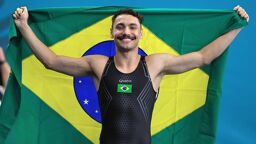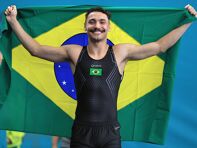As we close out Bisexual Awareness Week with Bi Pride Day, one athlete that deserves to be highlighted is volleyball player Haleigh Washington.
Formerly of Penn State, where she won a national championship, Washington now plays professionally in Novara, Italy.
She was called up to the US Women’s National Volleyball Team to compete in the belated 2020 Olympics. Washington helped lead her team to its first-ever gold medal, and also took home the honors of Best Middle Blocker of the tournament.
We had overlooked Haleigh in our initial list of out athletes competing at the Tokyo Games, so it’s overdue that we celebrate the importance of her presence on #TeamLGBTQ.
I am not cuffing my pants because I am tall, I am cuffing my pants because I am BISEXUAL!!! I just wanna be appreciated 😔
— Haleigh Washington (@Hales__Yeah) November 16, 2020
Last year Washington tweeted about being bisexual, which was taken as an official coming out, though she was clear in a follow up tweet that she was simply being herself, beyond the box of the traditional coming out “confessional” that’s been expected – and perhaps demanded – of LGBTQ+ people since Ellen’s Yep, I’m Gay magazine cover.
It’s definitely the new norm, especially with women athletes, to live their lives openly on social media without the burden of having to ‘other’ oneself by headlining their sexuality as breaking news.
As Washington explained in a story on Instagram last Friday:
I’m not trying to talk about my sexuality because I want to be brave or a trailblazer. I talk about my sexuality because I want to be myself. So, I guess today’s thought is just: if there are things that are holding you back from being your most authentic self, I hope you find a way to combat that, and to just be you, because you are perfect and beautiful exactly as you are, whatever that may be.

While Washington is one of a very small group of out volleyballers who competed at this past Olympics, being a Black player in the elite levels of the game is also being in a club that’s more exclusive than it should be.
“Volleyball has not done enough to be more welcoming,” head coach Sharon Clark said in a recent interview with Mechelle Voepel for The Undefeated on the importance of Black visibility in volleyball.
“There are lots of great players who make it. But there would be three, four…maybe tenfold more if we opened ourselves up more as a sport,” Voepel said. “The kids who get through tend to be from more middle-class to upper-class families who come from schools where they have a good basis for the sport. For kids from schools that are high African American population or very diverse, we literally exclude them from the sport.”
How we can utilize intersectionality to tell more liberatory dreams?
The Conversation reported in 2018 that more than 25% of Black women under 35 identified as lesbian or bisexual – a number more than two times higher than that of white women or other races, with the majority of the increase since 2016 accounted for by bisexual-identifying Black women.
This Bi Pride Day, we should consider that essential context and take time to give proper recognition to the Black bisexual women and non-binary athletes, like Haleigh Washington, whose presence in the LGBTQ+ community is growing.
As Penn State’s Dr. Monique Perry writes in the journal Perspectives on Urban Education, in an article titled Black Lives Matter, Intersectionality, and LGBTQ Rights NOW:
Intersectionality is not about a heightened version of victimization or identity politics. It is not just looking at additive experiences or axis points. Intersectionality actively challenges us to consider power dynamics, and to comprehensively honor lived experiences. It would be fair to ask how we can utilize intersectionality to tell more liberatory dreams.
I’m loving that the BLM movement is now also standing for and with the LGBTQ+ community. There is no Black Lives Matter without them https://t.co/EEuBKIQA3Z
— Haleigh Washington (@Hales__Yeah) June 15, 2020
We’ve covered several athletes over the years who have spoken about their individual experiences with bisexuality and Blackness, including the WNBA’s Natasha Cloud, who spoke to Alex Reimer on the Outports podcast “The Sports Kiki,” and basketball player Bri Tollie, who published her coming out story here last year. Track runner Kaitlyn Long published her story in 2019.
“It is important to be visible because everyone is unique,” Tollie wrote. “Our uniqueness means no one should not have to give up a part of themselves to conform.”
Happy #BiWeek!






























